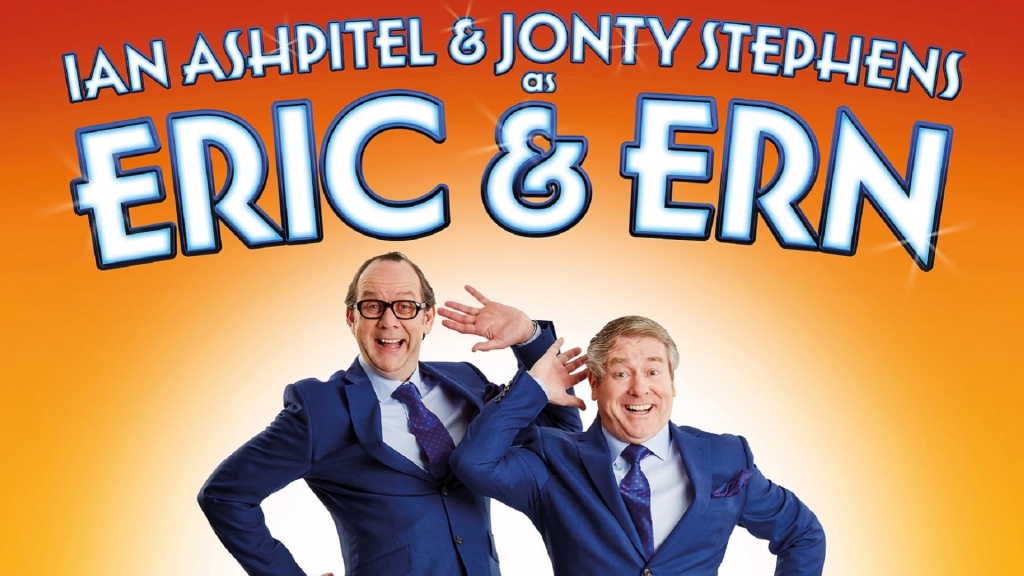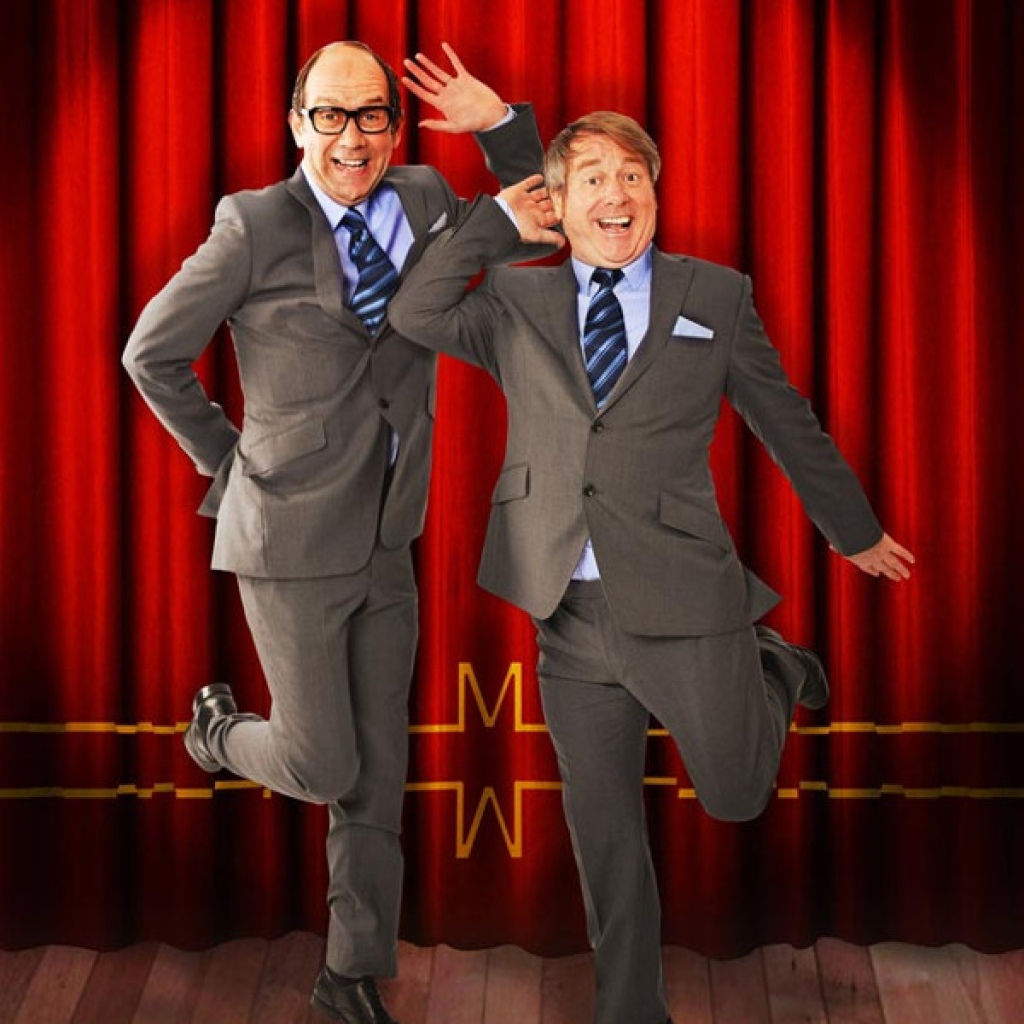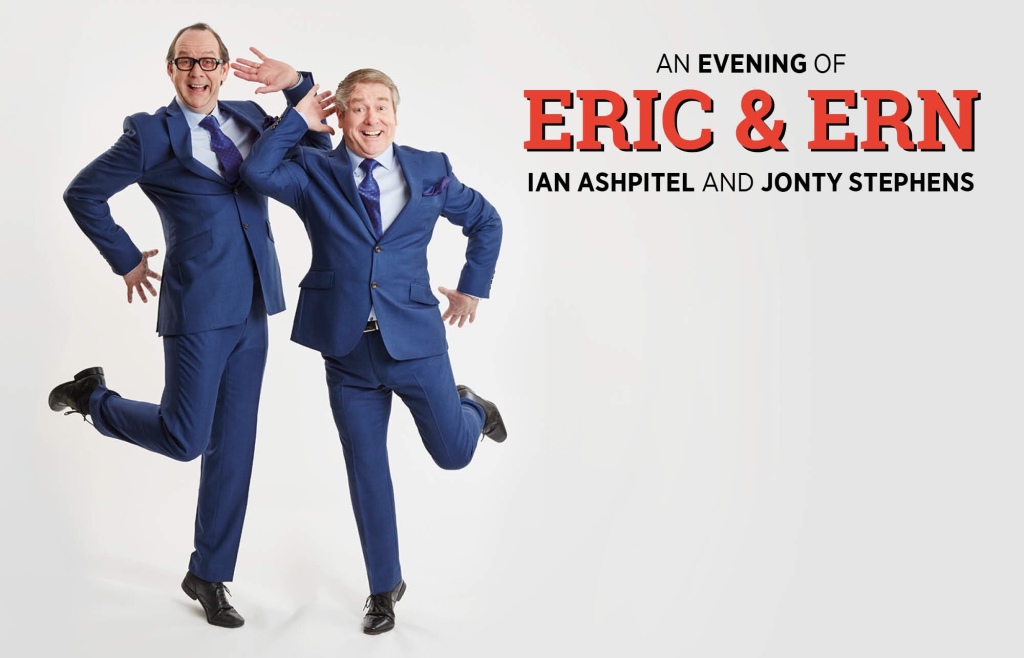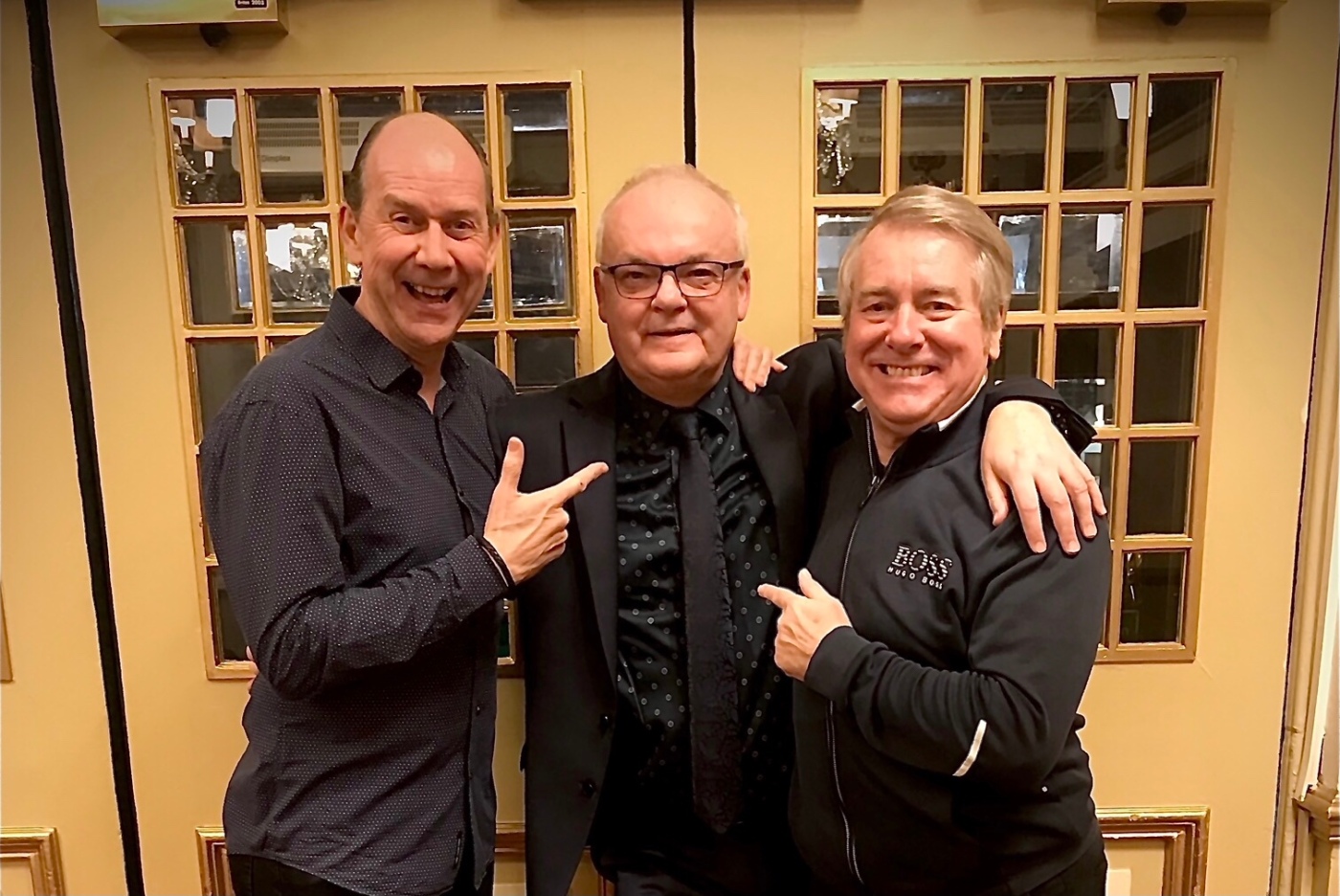January 2022
The much-celebrated and multi award-winning Morecambe and Wise remain beloved titans of the British comedy scene. Now, 81 years after the original double act started out, Ian Ashpitel and Jonty Stephens are honouring the pair with the concert-style show Eric and Ern. It’s a show with a journey beginning in 2002 with a five minute sketch, followed by the 2014 Olivier Award-nominated play Eric and Little Ern, and now heading out on a U.K. tour. Here, Gary Morecambe chats about the comic pair behind this show, the impact of the show itself and of course, his father’s impressive legacy.

What are audiences in store for with Eric & Ern?
It’s like going to a live Morecambe and Wise show. That’s the idea and audiences are in store for a nostalgic trip back in time. They’re going to remember Eric and Ernie fondly and somehow feel like they’re back in the 1970s because the show has that flavour to it. They’re in for a good night’s entertainment and it’s done very much as an homage to the working style of Morecambe and Wise from the days when they were touring in the 1970s, so it’ll be familiar to people who saw them on stage back then. Jonty Stephens [Eric] and Ian Ashpitel [Ernie] also bring in little bits from the TV shows, so there’s the breakfast routine and bits that reference André Previn.
How does it feel seeing your father portrayed by someone else?
Well, for me it will always be someone else. In fairness to Jonty and Ian, they are only one part of the Morecambe and Wise industry. We do documentaries, there’s the repeating of shows, there are all kinds of things going on, many projects that are discussed and executed. Jonty and Ian’s touring performance is another of those things – and a very good one, I must say – but I never for a moment think I’m sitting there watching my father because I used to do that all the time anyway when he was alive. But there are many moments when I’m sitting watching the show where I think ‘I could actually be watching Eric and Ernie’, which is lovely. The fact Jonty and Ian are good enough to make me feel that is really something.

Did they have your approval from the beginning?
I’ll admit I had a lot of doubts when this first started. I wasn’t running, jumping, skipping and saying ‘It’s brilliant that these two guys are doing this show about Morecambe and Wise’. There had been other attempts by other nameless people which were nothing short of disastrous, to be honest, so I was wary. But then I went to see them at Edinburgh because I’d had many tip-offs about them, both from people inside and outside of the industry, and when I saw the show that’s when I thought ‘They really are good’. That first time seeing them gave me a bit of a shiver down the spine, actually, because I went in there slightly on the attack and I came out bewildered almost – because they were that good. That was the beginning of our relationship and us as a family saying: ‘OK, you’re both very good actors, you certainly seem to recognise how Eric and Ernie worked, we’ll support you.’
Jonty and Ian have also written new material for the show. Do they run it past you for approval?
Yes, they do. It never started like that. It started in Edinburgh, as I say, then we met and got on as people – which was lovely. Over the years, just over a beer, I’ve made suggestions and they’ve been very kind and said ‘Yeah, we like that’. Now it’s a case of ‘Are you free next Thursday afternoon? Let’s have a meeting’. We meet somewhere and hammer out what we’re doing on the script so it becomes more of a joint effort, but I don’t want to be kind of claiming anything from it particularly. I just want them to do it as best they can and if I feel I can help with that and they feel I can help with that then it’s worth doing.
Has Jonty asked you for any advice on playing your dad?
The thing with both Jonty and Ian is that they’re both very good actors and they’ve watched so much material that I can’t really advise them on anything like that because they do it so perfectly. When you’re with Jonty and Ian there is very little Eric and Ernie about them, believe me. They’re actors and this is a very big job for them. That’s how they see it, that’s what they are, then when they go into Eric and Ernie I can sit back and think: ‘God, they’re really good. They’re doing it so well, this homage. They’re really getting it right.’ So no, I wouldn’t sit there and suggest anything. They don’t miss a trick because they’ve watched countless hours of Eric and Ernie in action. They know every little move, but they have to work with those moves because if they miss one the whole feel of it slips.
Lots of Eric and Ernie’s legendary sketches are recreated in the play. Do you have any particular favourites?
I love the whole thing. I’m not someone who breaks things down and I didn’t do that back in the day either. I can only go by the audience reaction and as soon as Jonty and Ian go anywhere near André Previn it’s like being at a rock concert. It’s quite extraordinary. Jonty and Ian were telling me about some nights when I wasn’t there where the audience has joined in. It’s a bit like The Rocky Horror Show where the audience joins in at certain points. There are moments with Eric and Ernie which are very well-remembered but the André Previn thing seems to be the clincher. But you have to bear in mind that they’re covering so much material around that. There’s lots of other stuff. Someone described it as an evening of the hits list being ticked off but I think it’s more subtle. They do a lot of Eric and Ernie that is slightly less remembered really but which is very funny. I like that element of it because it surprises people. There’s even material that Eric and Ernie were using during the live tours but which was written in, like, the early 1960s. It’s quite clever that Jonty and Ian are doing that. They’re not just saying ‘Let’s do Angela Rippon’ or ‘Let’s just doAndré Previn’. That would be too obvious.
How do you feel the show keeps the Morecambe and Wise legacy alive?
It’s kept alive anyway through the very fact they’re still being talked about 35 years later, but without a doubt the show is something that helps. It’s lovely that they’re getting a lot of younger people in the audience, who are getting a chance to see something of how Eric and Ernie would have been. They’re getting that Eric and Ernie vibe and it’s lovely seeing that on stage. We’ve made loads of documentaries and there have been loads of repeats, which will hopefully continue, so Eric & Ern is part of a bigger package and yes, it helps the legacy without a doubt.

Why is it important to you personally to keep that legacy going?
The obvious thing would be to say ‘Well, it’s my dad’ but I’m not sure if that’s the case. Maybe it’s because I came to Eric and Ernie at a very young age. I was five when I started school and my first day there was when I realised my father existed outside of the living room and TV at home. I learned it was a shared experience and I kind of put him on a pedestal at that point. I became really fascinated by him as an entertainer. That never stopped, which is probably why I’ve done countless books and all the rest of it. So I came at it from a very young age and it became part of my life. I had long periods where I was doing masses of other things and was well out of the Morecambe and Wise picture. But now as I’ve got older it’s just there, it has become important to me and I do like for people to see a bit of brilliance, because Eric and Ernie are pretty unique. That’s why we have plays and documentaries and everything; it’s because of their uniqueness. Jonty and Ian say that, by the way. They say: ‘We’re just actors and it’s Eric and Ernie’s uniqueness that makes it possible for us to do this play. It’s not about us.’ That’s very honest of them because it’s true.
What are your fondest memories of your father?
There are family memories, obviously, but also memories of living with this sort of virtuoso performance. They’re great memories and I remember him most as a comedian, I suppose. I often say to my sister, my wife and my kids, who never met him because they weren’t born then: ‘If I ever think of my father it’s always with a smile.’ You can’t think of him without smiling. Growing up with the comedy was a massive thing in my life.
Sounds like he was as funny at home as he was in public?
He was. He could have his moments of seriousness and stuff but they weren’t very long. Most of the time he was just funny, yeah. I’ve said it before, and I think it’s true, that people like me and you wake up in the morning thinking about what we’re having for breakfast. Dad would wake up and his first thought was ‘Where are the laughs coming from?’ He’d be looking around for what he could observe that was funny, then he’d worry about breakfast. It’s a bit of a strain and that’s the serious side of the business; it’s a lot to carry, a big burden, to be expected to be funny and then live up to it. He did just that and he did it brilliantly, but I’m sure it was a big strain on him. It probably didn’t do his health any good either, living through his image, but he really was funny to be around. He was always able to find the child within himself so he could get down to your level and be silly. He wasn’t a patronising father. He enjoyed the way children acted and thought. In a way, if you look at Morecambe and Wise, their shows and their material, they’re like big children themselves. [Laughs] He used to describe his work as ‘high class rubbish’, which I thought was a great line. How wonderfully dismissive of yourself is that? In a way their work was just childish fun with some subtle nuances in there for the adults.

Losing your father must have been devastating, but do you take comfort in the love people still have for him?
Totally. That’s absolutely right. I won’t say I’ve been fortunate because that’s the wrong word but when you think of everyday people who have a close relationship with their parents, then lose them, they’ve got no way of sharing that experience beyond family and friends. But I had, like, 29 million people on my side when Dad died. That in itself is a great protector, in a way. It makes life a lot easier. It could be argued that the only trouble with that perhaps is that you then don’t lead your own life so much. But, as I say, because Morecambe and Wise began at a very young age for me I feel like I have lead my own life but through them. It’s like that’s my purpose.
What do you think your dad would make of the play?
I think he’d be thrilled and I think Ernie would be too. They would have been thrilled that they haven’t been forgotten. Having Jonty and Ian, who do it so well, would have meant a lot to them – to be recognised and remembered in that way. Dad would have have been really chuffed about it.
And what do you most hope audiences around the country will take away from seeing it?
Many happy memories for those who do remember and an insight for young people who go along for the first time, then they go on YouTube and start watching the original clips.
So there you have it! You can catch Eric and Ern out on tour until April 30th, 2022 and you can find dates, venues and tickets here.
Interview courtesy of Cube Room Productions Ltd.

To find out more about my new biography about Morecambe and Wise, please visit: http://www.facebook.com/morecambeandwise
LikeLike